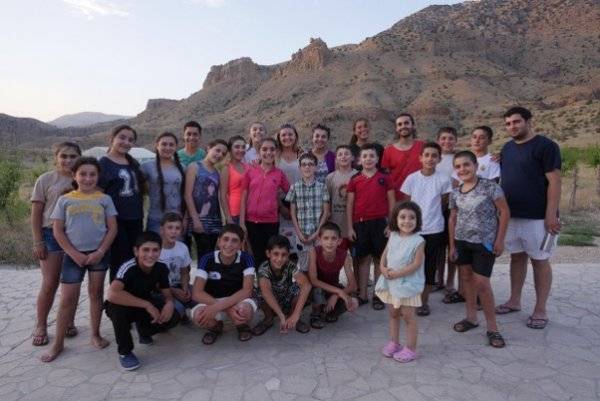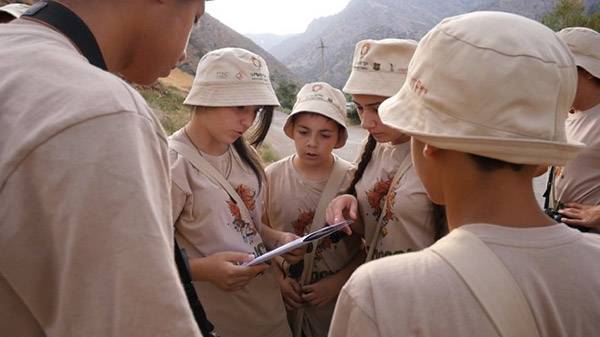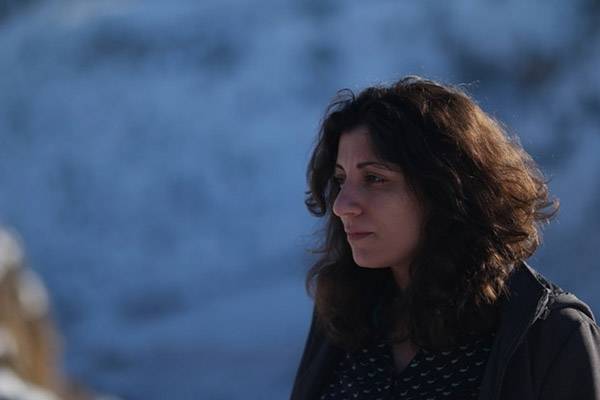SunChild Eco Clubs: Shaping Civic and Environmental Consciousness in Armenia
Guest blog by Eva Martirosyan, Deputy Director, Foundation for the Preservation of Wildlife and Cultural Assets (FPWC).

Throughout my 10 years and dozens of projects at the Foundation for the Preservation of Wildlife and Cultural Assets (FPWC), the SunChild environmental education project has always been a frontier guard for the inspiration and strength moving us forward to our conservation mission. In August 2016, at Birdfair in Rutland, thanks to an introduction by the World Land Trust, I had the pleasure and luck of meeting Dr. Rob Sheldon, OSME Chairman, and telling him about the “sunchildren” in Armenia. This encounter marked the start of the collaboration between OSME and FPWC and gave a new breath to the SunChild Eco Clubs project.
Start of the Road to a Different world
“SunChild” was like a window that has opened for me a way to the world that I would hardly otherwise discover”, Nare Filiposyan from Sisian, where one of the very first eco clubs was established in 2006, says. This summarizes what have felt hundreds of children from all over Armenia, who, taking the SunChild courses became change-makers in their communities and hit serious success milestones on personal development path.
SunChild Eco Clubs were born back in 2006. At the time the FPWC team had just finished the first series of documentaries on Armenian wildlife. In their concern to address the serious environmental issues of the time, the small team of filmmakers, biologists, environmentalists and media experts decided to invest the main resource they had – their knowledge – to change attitudes from the very roots. Thus the SunChild Eco Clubs idea was shaped and the curriculum was designed to combine environmental studies with photo/video and journalism courses, which became the core of the first environmental and civic education network in Armenia.
How it works
The SunChild Eco Club project is aimed at raising children’s awareness for environmental issues, at the same time providing them with tools to tackle those. Working with professional filmmakers, photographers, journalists and environmentalists, who appear as mentors rather than trainers, children identify environmental and social issues specific to their communities, and learn to make visual stories out of them. The students learn the importance of civic voice, and start to believe in their ability to make a change. They are grounding their study of large-scale issues in a solid and personal understanding of how things work in their own community.
More than 40 documentaries were authored by the “sunchildren” since 2006. Many of them have won honourable awards at international environmental film festivals.
On a long-term level, the project helped to counter the negative trends of social fragmentation and alienation from nature and community by helping the children find out by themselves the importance of reconnection to the natural and cultural world of which they are a part, and take the responsibility of community stewardship and civic life.
Most of the communities engaged in the environmental education project, are adjacent to the protected area managed by the FPWC. Often joining the daily work in the reserve as junior rangers, the sunchildren also become conservationist ambassadors to their communities. There is a youth leadership force formed over time that changes attitudes, builds trust, contributes to communities’ social and economic vitality, participatory governance and ecological integrity.
2017
More than 80 children from two marzes (local administrative divisions) participated in the SunChild Eco Clubs project, co-funded in 2017 by OSME and the US Forest Service. The 6-month curriculum comprised workshops on environmental photography and filmmaking, citizen reporting and social media, and sustainable lifestyle. For the first time since SunChild Eco Clubs creation, Project Development course was integrated in the curriculum, and mini-grants were allocated for implementation of the projects developed by children.
The peak point of the course was the Summer School on August 8-15, organized in the Eco Lodge in the Caucasus Wildlife Refuge for 20 students having showcased the best achievements throughout the year. For seven days of fun and learning the students participated in interactive workshops and games, green talks, film screenings and discussions, as well as an exciting scavenger hunt hiking trip in the CWR.

The students are currently working on the final edit of three short documentaries. Connection to nature in local cultural traditions, reciprocity of social, political and environmental issues are in the basis of topics chosen by children for this year’s films.
Three projects presented by children, featuring collection, hand-packing and sale of wild and medicinal herbs, paper recycling and bio-fertilizer production will be facilitated by the FPWC beginning from spring 2018. This will be the first step towards the sunchildren’s dream of making the eco-clubs self-sustained. In the meanwhile, their energy, enthusiasm and fresh outlook make them a community assets and regenerators of improved future.
In 2017, the SunChlid Eco Club project was highlighted as a success story by the global #NatureForAll campaign.
Eva Martirosyan: Since 2006, Eva has had a leading responsibility for the educational, event management and communication segments of the projects at the Foundation for the Preservation of Wildlife and Cultural Assets (FPWC). Since 2014 Eva is the FPWC Programmes Director, Director of the SunChild NGO and SunChild International Environmental Festival. In her position at the FPWC she is currently working on scheming Ecovillage Development Programme in Armenia. Eva has a certificate on Protected Area Management from the University of Montana.
FPWC: Established in 2002, FPWC is Armenia’s leading foundation for the protection and conservation of the country’s unique natural and cultural heritage. FPWC’s mission is to protect Armenia’s unique biodiversity and to raise public awareness for nature conservation and environmental issues. FPWC develops and implements wildlife and habitat conservation, community outreach and environmental education projects. FPWC has implemented projects nationwide and has an extensive experience in working with rural communities.

